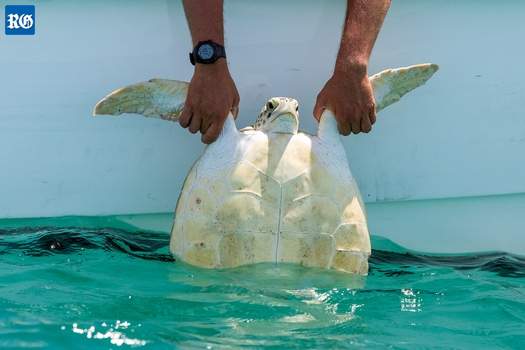Recent News
Olympian, Lionfish Expert & BIOS SupervisorTuesday, February 14, 2017
Those who have spent time around the Bermuda Aquarium, Museum and Zoo [BAMZ], participated in the annual Groundswell Lionfish Tournament, or remember the Blue Halo initiative, have likely heard of Chris Flook.
Charity cash boost from RUBiS
Tuesday, February 07, 2017
Twelve charities have received a total of more than $32,000 through a competition launched by RUBiS Energy Bermuda.
Local photographer wins BTA top award
Tuesday, February 07, 2017
Photographer Jorge Sanchez, who works with marine specimens at the Bermuda Aquarium Museum and Zoo, has been honoured by the Bermuda Tourism Authority.
Olympian, Lionfish Expert, and, Now, BIOS Supervisor
Wednesday, February 01, 2017
Those who have lived in Bermuda or spent time around the Bermuda Aquarium, Museum and Zoo (BAMZ), participate in the annual Groundswell Lionfish Tournament, or remember the Blue Halo initiative, have likely heard of Chris Flook.
Programmes teach children about nature
Tuesday, January 31, 2017
Thousands of children have benefited from the educational programmes organised by the Bermuda Zoological Society and the Bermuda Aquarium, Museum and Zoo in 2016.
About
GovernanceAbout Us
Newsletter
Latest News
Gift & Bookstore
Contact
General Inquiries
info@bzs.bm
Latest News
All the latest updates and news from the Bermuda Aquarium, Museum, and Zoo, one of Bermuda's leading visitor attractions!
Owain Johnston-Barnes
Published Jun 27, 2017 at 6:26 pm (Updated Jun 27, 2017 at 6:26 pm)

Nice day for a swim: A turtle caught in the Great Sound in the advance of America’s Cup
is returned to the West End (Photograph provided)
Almost 50 turtles caught in the Great Sound during the America’s Cup have been released after being temporarily held in Harrington Sound.
In May, the Ministry of the Environment announced it would be relocating turtles to prevent the animals from being struck by boats during the course of racing.
According to a spokeswoman, a total of 38 green turtles have been placed back in Western waters, while eight green turtles and three hawksbill turtles were released in the East End in mid-June and are expected to be making their way west.
“When the sea turtles were collected in late May, they were measured, weighed, photographed, microchipped and numbers were painted on their shells,” the spokeswoman said.
“It is estimated that the turtles ate 50 or more heads of lettuce per day while enclosed near the Bermuda Aquarium, Museum and Zoo. They were fed at the deepest point of the enclosure by submerging trays of lettuce arranged to mimic sea grass beds. In this way, human interaction was minimised to prevent habituation,
Ian Walker, the principal curator and veterinarian at BAMZ, said: “While protection of the turtles from heightened marine traffic was the principal aim, we were able to closely monitor this group of green sea turtles. That has added information to our database that some turtles are dealing with very high parasite burdens.
“BAMZ keeps detailed records of all turtles that pass through our hands, whether this group or the turtles brought to us by members of the public for treatment or necropsy. Based on all our data, we think that disease resulting from high parasite burdens is becoming increasingly common.
“As high parasite burdens, often related to malnutrition, is now one of the leading causes of turtle morbidity and mortality in Bermuda, BAMZ is actively pursuing research to better understand and deal with this issue.”
Before release, the turtles were weighed and had flipper tags attached. A very small DNA sample was taken from each individual turtle before groups of turtles were taken by boat to the area where they were first collected in the Great Sound. This is so that these individual turtles can be readily identified if they are returned to BAMZ.
The spokeswoman said the turtles were transported on their backs on beds made from swimming noodles to keep them from moving, and were kept cool and hydrated in transit.
“Now that they are back in the Great Sound, their purpose-built, temporary enclosure will be dismantled,” the spokeswoman added.


